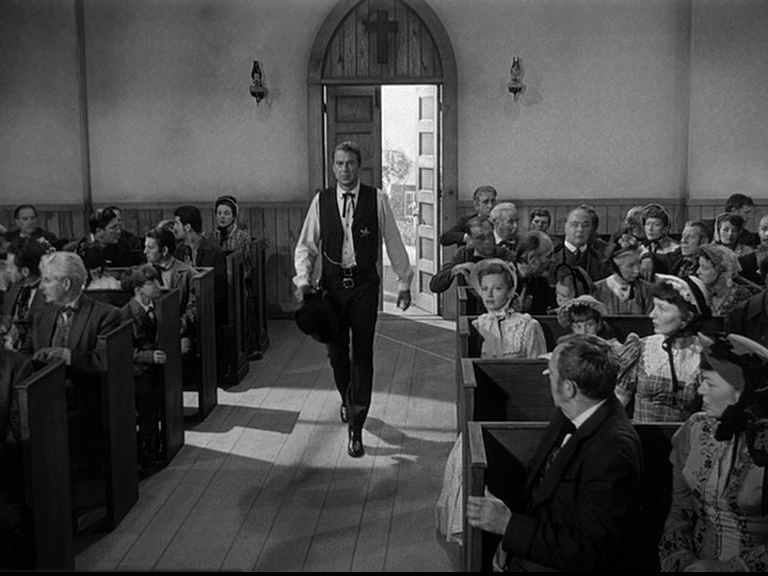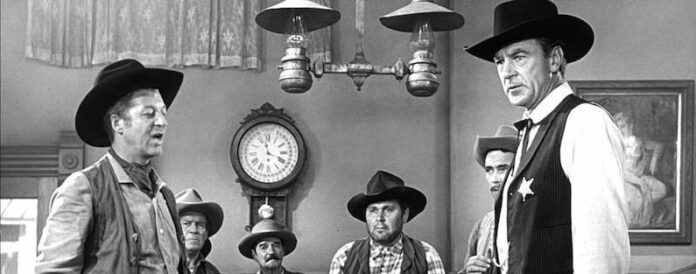Siamo negli Stati Uniti d’America, alla fine del XIX secolo, e precisamente nel 1898, in una piccola comunità di uno sperduto villaggio del West. Gary Cooper, uno dei grandi del cinema hollywoodiano degli anni cinquanta, recita la parte dello sceriffo che aveva imposto la legge nel villaggio, con rigore ma senza violenza. Si è appena dimesso per sposare la quacchera Grace Kelly, strepitosa nel recitare la parte di una giovane donna attonita e inizialmente quasi infantile, e con lei, tra gli applausi della comunità, si accinge a partire. Sul più bello giunge però la notizia che con il treno di mezzogiorno arriverà un delinquente che lo sceriffo aveva fatto condannare all’ergastolo alcuni anni prima, sorprendentemente graziato. E ad attenderlo alla stazione ci saranno tre membri della sua vecchia banda, pronti ad aiutarlo a mettere in atto la sua vendetta.
Il film Mezzogiorno di fuoco è un piccolo capolavoro girato da Fred Zinnemann nel 1952, classificato come uno dei più importanti trenta titoli nella storia del cinema americano, forse anche per l’universalità del suo messaggio. La comunità di oltre un secolo fa che nel film è rappresentata potrebbe infatti essere quella di oggi, e quel luogo un qualsiasi luogo del mondo, con tutti i suoi pregi, pochi, e con tutti i suoi, molti, difetti. I banditi sono il male, indiscutibilmente cinici, violenti, amorali. L’ex sceriffo, più che il bene, rappresenta la giustizia. Il bene, naturalmente, dovrebbe essere rappresentato dalla comunità, che però subito si mostra divisa tra quella cosiddetta “perbene”, oggi si direbbe moderata, che ritroviamo ben vestita e raccolta per gruppi familiari compatti in chiesa, e quella individualmente un po’ viziosa, ma pur sempre nei limiti di legge, che frequenta oziosamente il saloon.
Come affrontare il male che improvvisamente ritorna? L’ex sceriffo, il giusto, vorrebbe partire con la giovane moglie: far rispettare la legge in quella cittadina ormai non è più un problema suo. Ma il nuovo sceriffo che dovrebbe sostituirlo purtroppo non è ancora arrivato. I giusti però non possono mai girare la schiena ai problemi perché sanno, per antica esperienza, che i problemi è necessario affrontarli e non eluderli, se si vuole risolverli. Sono le undici del mattino, manca un’ora all’arrivo del treno e quindi del malvivente graziato, atteso dai suoi tre soci. Pare evidente a tutti noi spettatori che il giusto, da solo contro quattro, non potrà mai farcela. È necessario organizzare la comunità per fronteggiare l’imminente pericolo. L’ex sceriffo ci prova e manda a chiamare i pochi amici fidati, che però tergiversano e si sottraggono. Il giudice che anni prima aveva emesso la sentenza, sentendosi minacciato e in pericolo, dà subito l’esempio e se ne va. L’ex sceriffo va al saloon e parla agli oziosi, tutti muniti di cinturone e pistola, qualcuno anche bravo a usarla, forse. Ma pure loro si tirano indietro. Non sono contro o fuori dalla legge, ma certo non simpatizzano minimamente per essa.

foto di scena di Floyd Crosby
Lo sceriffo si reca allora in chiesa, dove è riunita la maggioranza della comunità, quella “perbene”, senza vizi e con molte dichiarate virtù: l’unità della famiglia, l’onore e il rispetto di se stessi e degli altri, il valore della legge… L’ex sceriffo sollecita quei buoni cittadini ad aiutarlo per aiutare se stessi a difendere le loro virtù e soprattutto il loro patrimonio dall’imminente, evidente pericolo. La risposta che riceve ha un valore universale e nello stesso tempo è ambiguamente e totalmente falsa, essendo lo sceriffo ormai dimissionario e non più alle loro dipendenze. Gli dicono invece che lui è pagato per svolgere quello sporco lavoro, e che non deve né può mettere a rischio nessun membro della comunità. Metafora perfetta di un ceto che nel tempo si è autodefinito, vantandosene in tutto il mondo, come quello dei “moderati”.
L’ex sceriffo Gary Cooper, il giusto, si ritrova così solo ad affrontare i quattro malviventi. Nel film lo farà, e per una volta – ma purtroppo, io credo, soltanto nella finzione cinematografica – avrà la meglio e riuscirà a prevalere. In fondo alla sua personale via crucis, che fortunatamente questa volta si conclude in modo a lui favorevole, ritrova la giovane moglie, umanamente cresciuta, e questa volta può partire davvero e per sempre, gettando nella polvere la stella di sceriffo.
When the movie reflects a community
We are in the United States of America, at the end of the nineteenth century, and precisely in 1898, in a small community in a remote village in the West. Gary Cooper, one of the great actors of Hollywood cinema of the 1950s, plays the part of the sheriff who had imposed the law in the village, with rigor but without violence. He has just resigned to marry the Quaker Grace Kelly, amazing in playing the part of an astonished and initially almost childish young woman, and with her, to the applause of the community, he is about to leave. On the most beautiful, however, the news arrives that with the midday train a criminal will arrive whom the sheriff had sentenced to life imprisonment a few years earlier, surprisingly pardoned. And waiting for him at the station will be three members of his old gang, ready to help him enact his revenge.
The High Noon film is a small masterpiece shot by Fred Zinnemann in 1952, classified as one of the thirty most important titles in the history of American cinema, perhaps also for the universality of its message. The community of over a century ago that is represented in the film could in fact be that of today, and that place any place in the world, with all its strengths, few, and with all its, many, defects. The bandits are evil, indisputably cynical, violent, amoral. The former sheriff, more than good, represents justice. The good, of course, should be represented by the community, which however immediately shows itself divided between the so-called “respectable” one, today we would say moderate, which we find well dressed and gathered for compact family groups in church, and the individually somewhat vicious one, but still within the limits of the law, which idly frequents the saloon.
How to deal with the evil that suddenly returns? The former sheriff, the just, would like to leave with his young wife: enforcing the law in that town is no longer his problem. But the new sheriff who should replace him has unfortunately not yet arrived. The righteous, however, can never turn their backs on problems because they know, from ancient experience, that problems must be faced and not evaded, if they are to be solved. It is eleven in the morning, an hour is missing for the arrival of the train and therefore of the pardoned criminal, expected by his three partners. It seems clear to all of us spectators that the right, alone against four, will never be able to do it. It is necessary to organize the community to face the imminent danger. The former sheriff tries and sends for the few trusted friends, who, however, prevaricate and evade. The judge who years earlier had issued the sentence, feeling threatened and in danger, immediately sets an example and leaves. The former sheriff goes to the saloon and talks to the idlers, all equipped with belt and pistol, someone even good at using it, perhaps. But they too back away. They are not against or out of the law, but they certainly do not sympathize with it in the least.
The sheriff then goes to church, where the majority of the community is gathered, the “respectable” one, without vices and with many declared virtues: family unity, honor and respect for oneself and for others, value of the law … The former sheriff urges those good citizens to help him to help themselves to defend their virtues and especially their heritage from the imminent, evident danger. The answer he receives has a universal value and at the same time is ambiguously and totally false, since the sheriff has now resigned and is no longer employed by them. Instead, they tell him that he is paid to do the dirty work, and that he must not and cannot put any member of the community at risk. Perfect metaphor of a class that over time has defined itself, boasting of it all over the world, like that of the “moderates”.
Ex-Sheriff Gary Cooper, the righteous, thus finds himself alone to face the four thugs. In the film it will, and for once – but unfortunately, I believe, only in the fiction of the cinema – it will prevail and succeed. At the end of his personal via crucis, which fortunately this time ends in a favorable way for him, he finds his young wife, humanly grown, and this time he can truly and forever leave, throwing the sheriff’s star in the dust.








